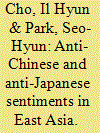|
|
|
Sort Order |
|
|
|
Items / Page
|
|
|
|
|
|
|
| Srl | Item |
| 1 |
ID:
107286


|
|
|
|
|
| Publication |
2011.
|
| Summary/Abstract |
Spanning the presidencies of George W. Bush and Barack Obama, anti-Americanism has become somewhat of a growth industry. Its products are avidly consumed not only in the United States but around the world, often for quite different political purposes. It is not surprising that anti-Americanism plays a large role among traditional enemies of the United States in the Middle East.1 But the same is true of America's allies just across the border, such as Canada and Mexico, and living far apart, such as Australia and New Zealand.2
It would be a big mistake, however, to think that these oppositional sentiments-the complex mixture of opinion, distrust and prejudice-are directed only against America. It plays a role in all parts of the world. Secondary or subordinate states in each world region resent the regional top dog. Such resentment can take various political forms. In Europe, latent anti-German feelings linger, sometimes very close to the surface. When Germany takes a stance against its partners in the European Union, as it has at various times in the unfolding financial crisis, historical anti-German sentiments are quick to appear. Small states in Latin America and Africa also harbour resentment against the self-proclaimed leadership roles of Brazil and Nigeria. And in the Middle East, cross currents of nationalism and religion generate different kinds of political resentment.
East Asia is no exception to this generalization. A large literature focuses on the role of history in shaping the region's current political fault lines. Even minor political crises of the day reveal lingering, deep resentments. In sharp contrast to Europe, however, painful historical memories continue to shape directly, even to provoke, current political crises. This is one important reason why, in a world of regions, East Asia differs from Europe.3 The heavy hand of history, however, has …
|
|
|
|
|
|
|
|
|
|
|
|
|
|
|
|
|
|
|
|
|